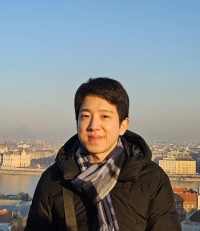Erdoes Group
Mathematics of Disordered Quantum Systems and Matrices
How do energy levels of large quantum systems behave? What do the eigenvalues of a typical large matrix look like? Surprisingly, these two very different questions have the same answer!
Large complex systems tend to develop universal patterns that often represent their essential characteristics. A pioneering vision of Eugene Wigner was that the distribution of the gaps between energy levels of complicated quantum systems depends only on the basic symmetry of the model and is otherwise independent of the physical details. This thesis has never been rigorously proved for any realistic physical system but experimental data and extensive numerics leave no doubt as to its correctness. Erdos’ group took up the challenge to verify Wigner’s vision with full mathematical rigor as well as to understand the underlying mechanism. Starting from the simplest model, a large random matrix with independent identically distributed entries, they are now able to deal with arbitrary distributions and even matrices with correlated entries. The mathematical ideas and tools developed along the way will extend the scope of random matrix theory and are likely to be used in its many applications beyond quantum physics such as wireless communications and statistics.
Team
Current Projects
Self-consistent resolvent equation and application in random matrices | Next order correction in the form factor for Wigner matrices | Local spectral universality for random band matrices | Spectral statistics of random matrices with correlated entries | Quantum spin glasses
Publications
Cipolloni G, Erdös L, Xu Y. 2026. Optimal decay of eigenvector overlap for non-Hermitian random matrices. Journal of Functional Analysis. 290(1), 111180. View
Erdös L, Henheik SJ, Vogel C. 2025. Normal typicality and dynamical typicality for a random block-band matrix model. Letters in Mathematical Physics. 116, 5. View
Riabov V. 2025. Linear Eigenvalue statistics at the cusp. Probability Theory and Related Fields. 193, 1183–1237. View
Riabov V. 2025. Universality in random matrices with spatial structure. Institute of Science and Technology Austria. View
Bao Z, Cipolloni G, Erdös L, Henheik SJ, Kolupaiev O. 2025. Decorrelation transition in the Wigner minor process. Probability Theory and Related Fields. View
ReX-Link: László Erdös
Career
Since 2013 Professor, Institute of Science and Technology Austria (ISTA)
2003 – 2013 Chair of Applied Mathematics (C4/W3), Ludwig Maximilian University of Munich, Germany
1998 – 2003 Assistant, Associate, Full Professor, Georgia Institute of Technology, Atlanta, USA
1995 – 1998 Courant Instructor/Assistant Professor, Courant Institute, New York University, USA
1994 – 1995 Postdoc, ETH Zurich, Switzerland
1994 PhD, Princeton University, USA
Selected Distinctions
2022 Fellow of the American Mathematical Society
2021 ERC Advanced Grant
2020 Erwin-Schrödinger Prize of the Austrian Academy of Sciences
2017 and 2018 ISI Highly Cited Researcher
2017 Leonard Eisenbud Prize
2016 Foreign Member, Hungarian Academy of Sciences
2015 Corresponding Member, Austrian Academy of Sciences (ÖAW)
2015 Member, Academia Europaea
2014 Invited Speaker, ICM
2013 ERC Advanced Grant
2007 – 2016 Participant of SFB TR12, Symmetries and Universality
1999 – 2005 NSF Grants
1993 – 1994 Alfred P. Sloan Foundation Dissertation Fellowship
Additional Information
Download CV
List of Publications
RMT Beyond
Mathphys Analysis Seminar website
Vienna Probability Seminar website
Physics & Beyond at ISTA
Mathematics at ISTA








